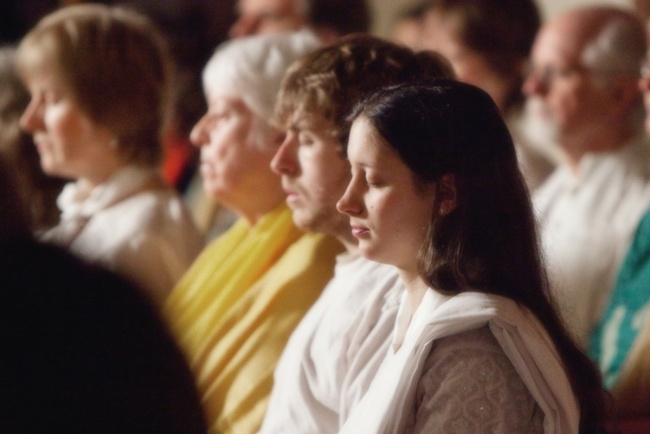The Devoted Heart
Long ago my youngest son, age five at that time, asked me, out of the blue: “Dad, do you exist?”
“Yes,” I responded, without thinking.
The answer, I now think, was just as interesting as the question, coming out of the mouth of a little child.
What made it interesting was its immediacy.
Of course I exist! A thousand fleeting joys, a thousand heartaches, a thousand hard lessons to be learned, and so much more of life’s abundance, have been making me keenly aware of the fact that I exist. All these impressions were perceived, and there can be no perception without existence.
When I write “perceived,” perhaps I really mean “felt.” Sri Yukteswar says: feeling makes existence conscious. By extension, the more our feelings are attuned to the spiritual abundance of the inner world, the more our consciousness expands. This attunement of feelings is called devotion.

The attunement of feelings is called devotion
Emotional maturity is required. Without it, there can be no spiritual growth. For the development of such maturity, music may well be the most efficient educational building block available within our schools and our homes.
Once during a walk, my oldest son, then fourteen years old, complained that he didn’t feel he could deal with all the assignments and the exams that the school demanded of him. I said: “What if I give you a list of musical pieces and ask you to listen to them regularly, especially in bed, before you fall asleep? You’ll see that if you are more in touch with the deeper feelings expressed in the music that I recommend, you will worry less about what other people think of you, and your mind will be calmer and work better for you.”
He liked the idea and enjoyed downloading on his cell phone the musical pieces I gave him. In fact, over the following months he became noticeably calmer and his schoolwork improved. Years later, I still feel that all the music he was exposed to during his childhood helped him on his way toward maturity as an adult.
In my own younger years, it was my heart, much more than my mind, that began to perceive the possibility of a consciousness greater than the once seemingly inextricable ego. When I first started reading about Swami Sri Yukteswar, there was a heart-based awareness, a feeling, of ancient memories evoked by those stories about the great Gyanavatar.
The same feeling still arises when Swami Sri Yukteswar wraps his aura around me through that little booklet that he wrote and to which these blogs are dedicated. Although I can by no means claim that I understand every word of The Holy Science, I do feel that his light of wisdom gradually spiritualizes the atoms in my heart. I become enthused; I steady my enthusiasm by making efforts to follow his instructions; I cultivate a desire to turn within. I develop devotion.
Devotion, Sri Yukteswar teaches us, is the heart’s desire for connection with the inner realities of the soul, and in particular with the “north” or positive pole of the sixth chakra, the ajna chakra – the spiritual eye, also known as the “third eye,” at the point between the eyebrows. He also calls it Bhakti Yoga and describes it as follows:
By this (…) concentration of self on the sensorium (the central spine out of which the nerves lead to the five senses) man becomes baptized or absorbed in the holy stream of the Divine Sound. This baptism is called Bhakti Yoga. In this state man repents; that is, turning from this gross material creation of Darkness, Maya, he climbs back toward his Divinity, the Eternal Father, whence he has fallen …[i]

man climbs back toward his Divinity, the Eternal Father
Our perception of existence then gradually expands beyond the habitual confines of the ego, and the natural love of the heart, as the Gyanavatar calls it, begins to manifest. Can there be any more fulfilling process in life?
Life may well give us intense experiences of human love. But if these experiences are not coupled with the inner realities of the soul, they threaten to leave us empty or plagued with feelings of sorrow and nostalgia. We would then be missing the point: by not feeling what can really fulfill our need for love, we become needy.
Maybe that is the reason why so many great novels end with the anticipated marriage of the hero and the heroine. Italy’s most famous classic, called “The Betrothed” in English, finishes just before the wedding. After marriage, the everyday realities of family life and the trying confrontations with the material world demand depth and intense spiritual effort – a less appealing conclusion for a good romance novel.
Yet it is our love life that can teach us the most about love, not merely as a fleeting romance or physical union, but as a state of consciousness. Whether married or single, with children or childless, that state of consciousness can become ours, with every effort we make to develop devotion.
[i] The Holy Science, by Swami Sri Yukteswar Giri. Published by Self-Realization Fellowship, Eight Edition, 1990

One Comment
Dat klopt helemaal. Als het gevoel van leven en emotions van het dagelijks leven kalm worden en geaccepteerd in hun aanwezigheid, wordt je toeschouwer. Het hart wordt kalm waardoor er meer ruimte ontstaat om in je innerlijk bewustzijn te leven. De combinatie van hersenen samen met het gevoel brengt je op een hoger en dieper niveau. En geeft ruimte voor Devotie.